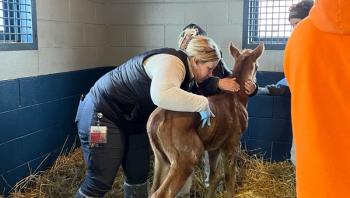
FVMA vies to grow political muscle at grassroots level
The profession doesn't have the money or numbers to alter legislation, so becoming involved is imperative.
ORLANDO — In a push to encourage veterinarians to become more politically involved, the Florida Veterinary Medical Association (FVMA) embraced the concept of practitioners supporting or becoming political candidates at the association's annual conference.
The event welcomed 800 veterinarians and technicians, the highest attendance in the past few years, says FVMA Executive Director Don Schaefer.
"We hosted a member luncheon with the Government Relations Committee; about 150 veterinarians were in attendance," he adds.
Luncheon talk included how veterinarians can speak as a collective voice in effort to best serve the profession.
"Veterinarians need to enhance legislative effectiveness, as to not be overrun by powerful forces outside of the profession," says Dr. Stephen Shores, FVMA president. "The veterinary profession doesn't have the money or numbers to alter legislative agendas. Becoming involved on some level is imperative."
Shores says veterinarians tend to be apolitical and do not want to become involved in controversial issues, but they must become politically savvy if expected to be looked upon for opinions and as expert witnesses.
FVMA has employed a part-time lobbyist to jumpstart the effort, Shores says.
"The executive board, myself and the executive director are making this a priority.
A veterinarian with political experience
From 1988 to 1998, Dr. Robert Sindler served in the Florida State House of Representatives and is currently serving as the Orange County Commissioner.
"Veterinarians have a lot of expertise to offer, scientific and business," Sindler says. "Many laws are made that directly affect the profession. This is why veterinarians must have a voice."
A campaign for a position on the State House of Representatives easily can cost $200,000 and can run upwards of $1.5 million, Sindler says.
If veterinarians do not feel they can run for a political office, talking to state representatives, local politicians and keeping up with issues is a good start.
"If someone in office considers you (as a veterinarian) a resource, you can be successful in communicating your opinion on an issue," Sindler says. "Veterinarians tend to not like politics, but I think as a whole, we are beginning to recognize the need to be involved. Politics will involve you whether you like it or not."
Sindler sold his practice when he was called to duty in Afghanistan. He now works at the Eastlake Veterinary Clinic two days a week and is at his Orange County office the rest of the week.
He plans to run for the Florida House in November.
Getting Involved
"Hot button issues activate my interest in politics," says Dr. Richard Wilks, FVMA past president. "I became interested out of necessity."
In the last legislative session, veterinarians wanted to close a loophole that allowed companies access to client names and contact information — considering it proprietary. The bill failed, but officials expect it to be presented again in 2006.
"Altering the practice act and issues that pertain to non-veterinarians performing therapies on animals are issues veterinarians should be on top of," Wilks says.
Politicians need support of the community. If veterinarians become involved, then voting members of the legislature might consider confiding in a practitioner when making a decision.
Wilks notes that you must have thick skin to run for office, which is one of the reasons he encourages others to run instead of taking politics by the reins himself.
"I'm a good cheerleader for veterinarians, but other obligations restrict me from running," Wilks says.
During the legislative session, Wilks joined other FVMA members to walk the halls of the legislative building to introduce themselves and talk about issues. Once a year, the FVMA invites lawmakers to lunch to talk about veterinary issues.
"Veterinarians haven't put themselves in a position to be called upon," Wilks says. "We are seen as compassionate, non-confrontational and low key.
"Only 4 percent of the 70,000-plus members of AVMA financially contribute to the Political Action Committee (PAC)," Wilks says. "Deciding to become involved in politics is an uncomfortable start, but veterinarians need to pick up the phone and talk to a candidate, keeping in mind a $50 contribution goes a long way."
Newsletter
From exam room tips to practice management insights, get trusted veterinary news delivered straight to your inbox—subscribe to dvm360.




